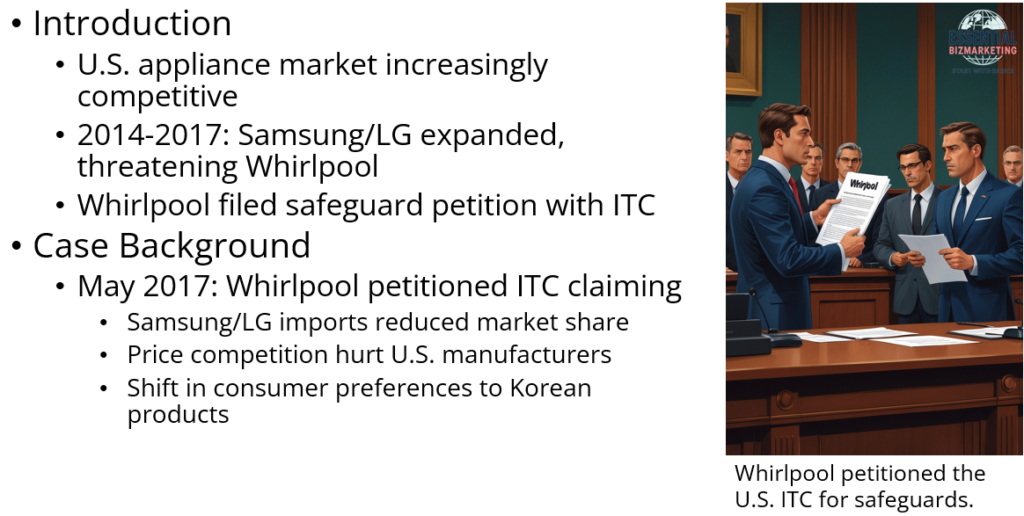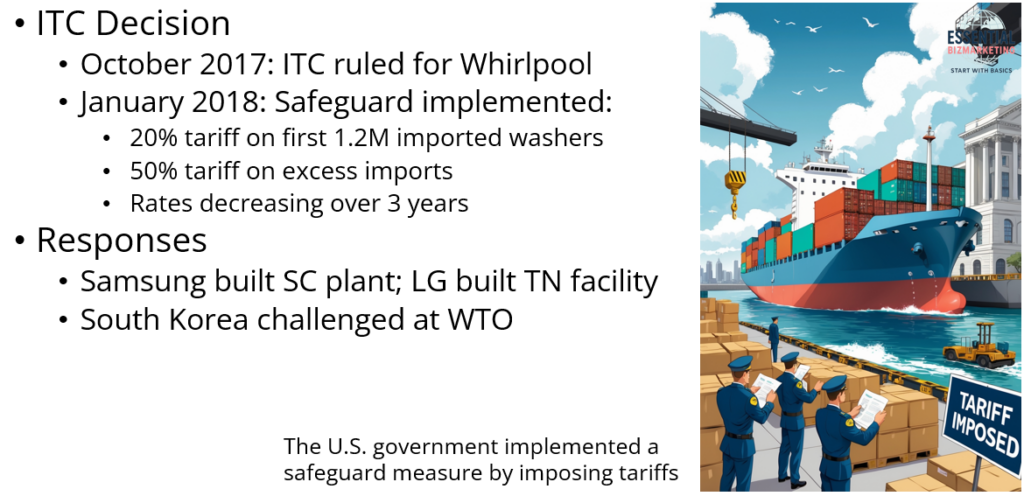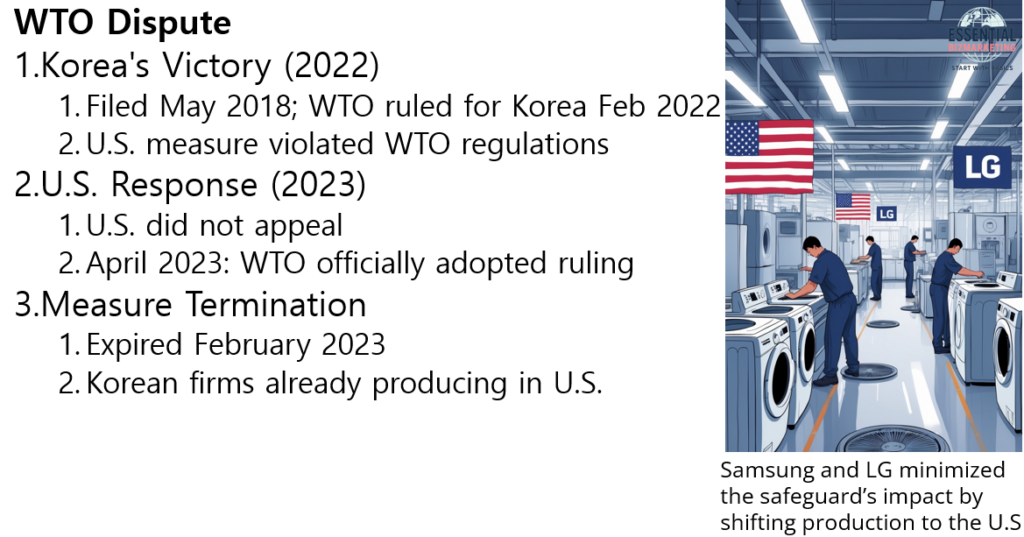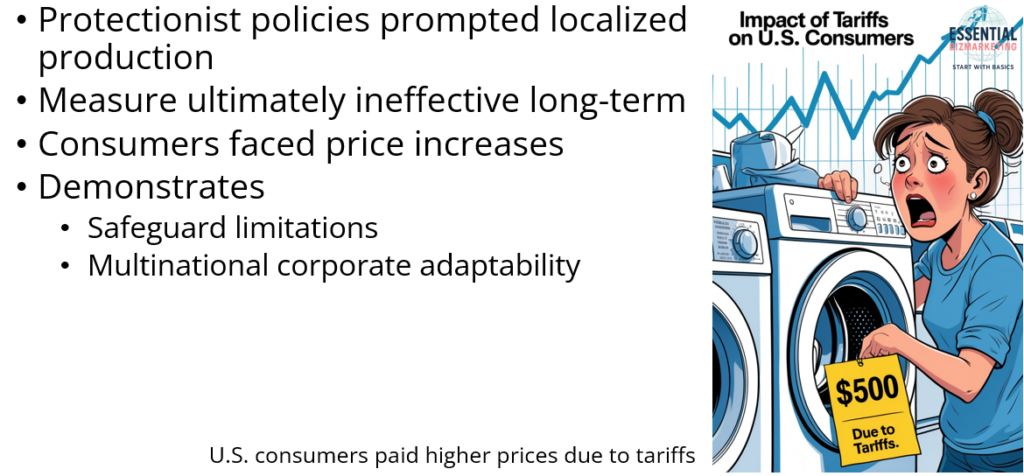Introduction

The U.S. home appliance market has become increasingly competitive, with Whirlpool employing various strategies to maintain its market share. However, from 2014 to 2017, Samsung and LG rapidly expanded their market presence, threatening Whirlpool’s position. In response, Whirlpool filed a safeguard petition with the U.S. International Trade Commission (ITC).
Background of the Case
In May 2017, Whirlpool petitioned the ITC, claiming that imports of large residential washing machines from Samsung and LG were causing serious injury to the U.S. domestic industry. Whirlpool’s key arguments included:
- Increased imports of Samsung and LG washing machines had reduced Whirlpool’s market share.
- Intense price competition had negatively impacted U.S. manufacturers.
- Consumer preferences had shifted toward Korean products, weakening Whirlpool’s long-term competitiveness.
Investigation and Decision by the ITC

In October 2017, the ITC ruled in favor of Whirlpool, concluding that increased imports of washing machines were causing serious injury to the U.S. domestic industry. Consequently, in January 2018, the U.S. government implemented a safeguard measure with the following terms:
- A 20% tariff was imposed on the first 1.2 million imported washing machines annually.
- A 50% tariff was imposed on any imports exceeding that threshold.
- The tariff rates were scheduled to decrease over three years: 20%/50% in the first year, 18%/45% in the second year, and 16%/40% in the third year.
Impact and Responses
Following the safeguard implementation, Samsung and LG expanded their U.S. manufacturing presence. Samsung established a plant in South Carolina, while LG opened a facility in Tennessee to mitigate the impact of tariffs. Additionally, the South Korean government challenged the safeguard measure at the World Trade Organization (WTO), arguing that it violated international trade agreements.
WTO Dispute and Subsequent Actions

- WTO Case and Korea’s Victory (February 2022):
- In May 2018, South Korea filed a dispute with the WTO, claiming that the U.S. safeguard measure violated WTO agreements.
- In February 2022, the WTO ruled in favor of South Korea, determining that the U.S. safeguard measure was inconsistent with WTO regulations.
- U.S. Decision Not to Appeal and Ruling Confirmation (April 2023):
- The U.S. opted not to appeal the WTO ruling, and in April 2023, the WTO’s Dispute Settlement Body (DSB) officially adopted the decision.
- This ruling confirmed that the U.S. safeguard measure was unlawful, setting a precedent against the misuse of safeguard mechanisms.
- Termination of the Safeguard Measure (February 2023):
- The safeguard measure, initially set for three years, was extended once but ultimately expired in February 2023.
- By this time, Samsung and LG had already adapted by shifting production to U.S.-based facilities, reducing the immediate impact of the safeguard’s expiration.
Conclusion and Key Takeaways

This case highlights the impact of protectionist trade policies on global businesses. While Whirlpool’s safeguard petition temporarily protected its market position, it ultimately prompted Samsung and LG to localize production, rendering the measure ineffective in the long run. Additionally, U.S. consumers bore the cost of price increases due to the tariffs. The case serves as an important lesson in international trade, illustrating both the limitations of safeguard measures and the strategic adaptability of multinational corporations.
📚 References
Whirlpool Corporation. (2017, May 31). Whirlpool Corporation filing safeguard petition to stop Samsung, LG from repeatedly evading U.S. trade laws. Whirlpool Corporation. Link
World Trade Organization. (2022, February 8). WTO dispute panel issues report regarding US safeguard on large residential washers. World Trade Organization. Link
World Trade Organization. (n.d.). United States — Safeguard measure on imports of large residential washers. World Trade Organization. Link
United States International Trade Commission. (2023, February). Large residential washers: Evaluation of the effectiveness of import relief. United States International Trade Commission. Link
Stewart, T. P. (2022, February 9). The WTO panel report, United States – Safeguard measure on imports of large residential washers, WT/DS546/R (8 February 2022). Current Thoughts on Trade. Link
The Hankyoreh. (2022, February 9). S. Korea prevails in WTO dispute over US tariffs on washing machines. The Hankyoreh. Link
Yonhap News Agency. (2022, February 9). S. Korea wins WTO ruling over Trump-era washer safeguard tariffs. Yonhap News Agency. Link
Office of the United States Trade Representative. (n.d.). United States – Safeguard measure on imports of large residential washers. Office of the United States Trade Representative. Link
Wikipedia contributors. (2023, October 1). Antidumping case about washing machines. Wikipedia, The Free Encyclopedia. Link
📁 Start exploring the Blog
📘 Or learn more About this site
🧵 Or follow along on X (Twitter)
🔎 Looking for sharp perspectives on global trade and markets?
I recommend @GONOGO_Korea as a resource I trust and regularly learn from.
